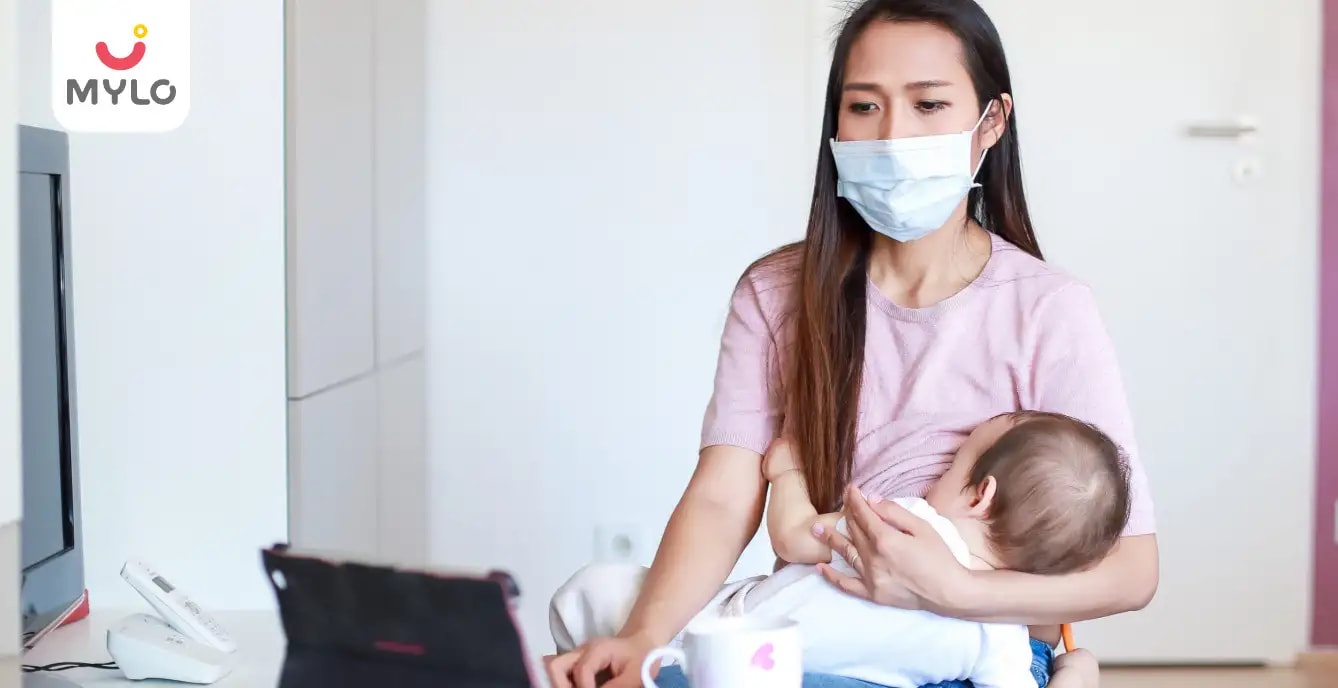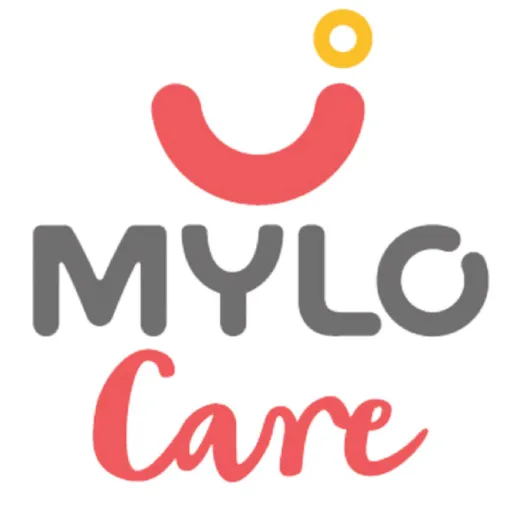Home

Fever During Breastfeeding: Tips from Experts for New Moms
In this Article

Fever During Breastfeeding: Tips from Experts for New Moms
Updated on 4 February 2026
As a new mother, breastfeeding can be a wonderful experience. However, when you're feeling under the weather, it can be difficult to know how to proceed. While fever is often temporary, many moms also look for gentle breastfeeding support and nutritional options during postpartum recovery, such as natural lactation supplements made with ingredients like Shatavari. One common issue that new moms face is having a fever during breastfeeding.
What are the causes of fever during breastfeeding?
Fever can be a common occurrence during breastfeeding, and it is important for new moms to understand the causes and how to manage it. Here are some of the possible causes of fever in breastfeeding moms:
1. Mastitis
Mastitis is a breast infection that can occur when bacteria enter the breast tissue through a cracked nipple or a blocked milk duct. Symptoms of mastitis include fever, breast pain, and redness. Treatment typically involves antibiotics and continuing to breastfeed or pump to clear the milk duct.
2. Engorgement
Engorgement occurs when there is an excess of milk in the breast, leading to swelling, pain, and sometimes fever. This can be managed by breastfeeding or pumping frequently, using cold compresses, and ensuring proper positioning and latch.
3. Dehydration
Breastfeeding can be dehydrating, especially during the early postpartum period. Dehydration can lead to fever, among other symptoms. It is important for new moms to stay hydrated by drinking plenty of water and other fluids.
4. Other Infections
Other infections, such as a urinary tract infection or a respiratory infection, can also cause fever while breastfeeding. These infections should be treated promptly by a healthcare provider.
Fever during breastfeeding can be uncomfortable and concerning, but it is often treatable and manageable. New moms should not hesitate to seek medical advice if they experience persistent or severe fever or other symptoms. With proper management and care, moms can continue to breastfeed their babies while recovering from fever.
Can I breastfeed if I have fever?
Many new moms wonder can we breastfeed during fever. The answer is usually yes, but there are some situations where it may not be recommended. If you have a contagious illness, such as the flu, it's important to take precautions to prevent the spread of the illness to your baby. This may mean wearing a mask while breastfeeding or pumping and having someone else feed your baby for a few days.
If you have mastitis or another breast infection, it's generally safe to breastfeed. In fact, breastfeeding can help to relieve symptoms and speed up the healing process. If you're unsure whether or not it's safe to breastfeed with a fever, consult with your healthcare provider.
You may also like : Breastfeeding Through Illness: Tips for Nursing Mothers While Sick
7 Tips to help you breastfeed in fever
If you're experiencing a fever while breastfeeding, there are several tips that can help you manage the situation. Here are seven tips from medical experts:
1. Stay hydrated:
It's important to drink plenty of fluids, such as water or herbal tea, to stay hydrated and help bring down your fever.
2. Get plenty of rest:
Rest is crucial when you're fighting off an infection. Try to get as much sleep as possible and take naps when your baby is sleeping.
3. Use cold compresses:
Applying cold compresses to your forehead or the back of your neck can help to bring down your fever.
4. Take acetaminophen:
Acetaminophen (such as Tylenol) is generally safe to take while breastfeeding. Consult with your healthcare provider before taking any medication.
5. Wear loose clothing:
Tight clothing can make you feel uncomfortable and increase your body temperature. Wear loose, comfortable clothing to help regulate your body temperature.
6. Take a warm bath:
A warm bath can help to relax your muscles and bring down your fever.
7. Practice good hygiene:
Wash your hands frequently and avoid close contact with others to prevent the spread of illness.
Which medications to avoid while breastfeeding in fever?
While some medications are safe to take while breastfeeding, others should be avoided. Here are some medications to avoid if you have a fever while breastfeeding:
-
Aspirin: Aspirin can be harmful to babies and should not be taken while breastfeeding.
-
Ibuprofen: While ibuprofen is generally safe to take while breastfeeding, it may decrease milk supply in some women. Consult with your healthcare provider before taking ibuprofen.
-
Decongestants: Decongestants can decrease milk supply and should be avoided while breastfeeding.
-
Antihistamines: Antihistamines can cause drowsiness in both you and your baby and should be used with caution while breastfeeding.
Always consult with your healthcare provider before taking any medication while breastfeeding.
5 Home remedies for fever during breastfeeding
In addition to the tips mentioned above, there are several home remedies that can help to alleviate a fever while breastfeeding, such as:
1. Ginger tea:
Ginger has natural anti-inflammatory properties that can help to reduce fever. Drink ginger tea or add fresh ginger to your meals.
2. Echinacea:
Echinacea is an herb that can help to boost your immune system and fight off infections. You can take echinacea in supplement form or drink echinacea tea.
3. Garlic:
Garlic has natural antibacterial and antiviral properties that can help to fight off infections. Add garlic to your meals or take garlic supplements.
4. Elderberry:
Elderberry is an herb that can help to reduce fever and relieve cold and flu symptoms. You can take elderberry in supplement form or drink elderberry tea.
5. Vitamin C:
Vitamin C can help to boost your immune system and fight off infections. Eat foods that are rich in vitamin C, such as citrus fruits and leafy greens, or take a vitamin C supplement.
When to see a doctor
If your fever persists for more than 24-48 hours or is accompanied by other symptoms, such as severe pain or difficulty breathing, it's important to see a healthcare provider. You may need antibiotics or other medical treatment to help you recover.
You may also like : Breast Pump 101: The Ultimate Guide to Stress-Free Pumping Sessions
How to prevent fever during breastfeeding?
Preventing fever while breastfeeding is not always possible, but there are some steps you can take to reduce your risk of infection. Here are some tips:
-
Practice good hygiene: Wash your hands frequently and avoid close contact with others who are sick.
-
Get vaccinated: Vaccinations can help to prevent illnesses, such as the flu, that can cause fever.
-
Get plenty of rest: Rest is important for your immune system. Try to get enough sleep and take breaks when you need them.
-
Eat a healthy diet: Eating a healthy, balanced diet can help to support your immune system and reduce your risk of infection.
FAQ's
1. Is breastfeeding with a fever of 102 safe?
A fever of 102 is considered high and can be a sign of a serious infection. While it is generally safe to breastfeed with a fever, it's important to consult with your healthcare provider if your fever is this high. You may need medical treatment to help you recover.
2. Can I take Dolo 650 for fever while breastfeeding?
Dolo 650 is a pain reliever and fever reducer that contains paracetamol. It is generally safe to take Dolo 650 while breastfeeding, but it's important to consult with your healthcare provider before taking any medication.
The Bottomline
Fever during breastfeeding can be a challenging experience for new moms. However, with the right knowledge and support, it is possible to manage this situation and continue to breastfeed your baby. Remember to stay hydrated, get plenty of rest, and consult with your healthcare provider if you have any concerns. With these tips, you can stay healthy and enjoy the benefits of breastfeeding.
References
1. Mother To Baby | Fact Sheets [Internet]. Brentwood (TN): Organization of Teratology Information Specialists (OTIS); 1994-. Fever | Hyperthermia. NCBI
2. Drugs and Lactation Database (LactMed®) [Internet]. Bethesda (MD): National Institute of Child Health and Human Development; 2006-. Acetaminophen. NCBI



Written by
Mylo Care
Happiness starts with you!
Read MoreGet baby's diet chart, and growth tips

Related Articles
Related Questions
Hello frnds..still no pain...doctor said head fix nhi hua hai..bt vagina me pain hai aur back pain bhi... anyone having same issues??

Kon kon c chije aisi hai jo pregnancy mei gas acidity jalan karti hain... Koi btayega plz bcz mujhe aksar khane ke baad hi samagh aata hai ki is chij se gas acidity jalan ho gyi hai. Please share your knowledge

I am 13 week pregnancy. Anyone having Storione-xt tablet. It better to have morning or night ???

Hlo to be moms....i hv a query...in my 9.5 wk i feel body joint pain like in ankle, knee, wrist, shoulder, toes....pain intensity is high...i cnt sleep....what should i do pls help....cn i cosult my doc.

Influenza and boostrix injection kisiko laga hai kya 8 month pregnancy me and q lagta hai ye plz reply me

RECENTLY PUBLISHED ARTICLES
our most recent articles

Side Effects of Breastfeeding While Lying Down: Is It Worth the Risk?

17 Foods to Avoid While Breastfeeding: Expert Guide for New Moms
Diapering
What to Pack and What to Skip When Travelling with a Baby
Infant
How Baby Sleep Patterns Change in the First Year and What Parents Can Do
Diapering
Choosing the Best Baby Diapers in India for a Rash-Free, Happy Baby
Infant
What Kind of Diapers for Babies Keep The Little One's Comfortable, Dry and Happy
- Indian Food Chart for Your 10-Month-Old Baby – Week 1
- 10 Month Old Baby Food Chart/Meal Plan – Week 2
- 10 Month Old Baby Food Chart/Meal Plan – Week 3
- Indian Food Chart for Your 8-Month-Old Baby – Week 1
- Best Christian Baby Boy Names That Are Unique and Timeless 2026
- The Ultimate Collection of Girl Baby Names in Tamil 2026
- Yellow Discharge Before Period: Is It Normal or a Cause for Concern?
- Evaporation Line vs Faint Positive: The Ultimate Guide to Pregnancy Test Results
- How to Check Pregnancy at Home with Fingers?
- North Indian Diet Plan for New Moms (0–6 Months Baby)
- North Indian Diet Plan for Mothers (6+ Months Baby)
- South Indian Diet Plan for New Moms (0–6 Months Baby)
- South Indian Diet Plan for Mothers (6+ Months Baby)
- New Flu Strain Alert – Why Adults Should Get Vaccinated Now


AWARDS AND RECOGNITION

Mylo wins Forbes D2C Disruptor award

Mylo wins The Economic Times Promising Brands 2022
AS SEEN IN
















- Mylo Care: Effective and science-backed personal care and wellness solutions for a joyful you.
- Mylo Baby: Science-backed, gentle and effective personal care & hygiene range for your little one.
- Mylo Community: Trusted and empathetic community of 10mn+ parents and experts.
Product Categories
baby carrier | baby soap | baby wipes | stretch marks cream | baby cream | baby shampoo | baby massage oil | baby hair oil | stretch marks oil | baby body wash | baby powder | baby lotion | diaper rash cream | newborn diapers | teether | baby kajal | baby diapers | cloth diapers |




